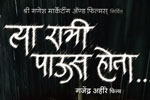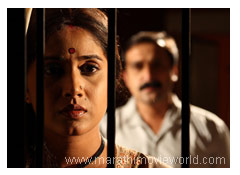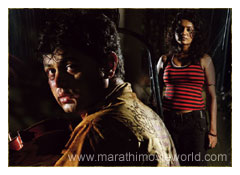Tya Ratri Paus Hota
Release Year: 2009
Genres: Drama
Rating:
Censor: U/A
Duration: 120 mins
Producer: Sunil Fadtare, Supriya Fadtare, Shree Ganesh Marketing and Films
Exe-Producer: Janaki Amrute
Co-Producer: na
Director: Gajendra Ahire
Writer: Gajendra Ahire
ScreenPlay: na
Dialogues: na
Cast & Crew
Exe-Producer: Janaki Amrute
Co-Producer: na
Director: Gajendra Ahire
Writer: Gajendra Ahire
ScreenPlay: na
Dialogues: na
Lyrics: na
Music: Narendra Bhide
Singers: na
Cinematography: Chandrashekhar Iyyer
Art: na
Make Up: Sandip Singh
Publicity Designs: Studio Link Pvt. Ltd.
Sound Engi: Abhijit Deo Still Photography: Nikhil Naghazrkar
Awards: Maharashtra State Government Film Awards 2009 Nomination for Best Actress: Amruta Subhash Nomination for Best Actor: Sayaji Shinde
Winner- Best Cinematography: Chandrashekhar Ayyer
Cinematography: Chandrashekhar Ayyer
Sound: Narendra Sharma
Editor: Shivaji Chaudhari, Gajendra Ahire
Cast: Amruta Subhash, Subodh Bhave, Sayaji Shinde, Sonali Kulkarni, Sandip Mehata, Milind Shinde
Synopsis
Videos
News / Article / Interviews
Movie Still(s)
Poster(s)
Review
‘TYA RATRI PAUS HOTA’ REVIEW
 |
Rating: ★★ ½
Presenter: Shemaroo Entertainments, Gipsy & Janaki Productions Production: Shree Ganesh Marketing and Films Story- Screenplay – Director: Gajendra Ahire Music: Narendra Bhide Cinematography: Chandrashekhar Iyyer Cast: Amruta Subhash, Subodh Bhave, Sayaji Shinde, Sonali Kulkarni, Sandip Mehata, Milind Shinde Movie Review by: Namrata Thosar |
Socio-political criticism has remained no more a new thing. Many political satires and feminist issues were introduced in different films. What makes Gajendra Ahire always outstanding is the rich permutation –combination of story, plot, dialogue and direction present in his mind at a time. His treatment to traditional issues gives them novelty. This time, his ‘Tya Ratri Paus Hota’ gives us the treat of socio-political thriller.

Two travelers moving towards different destinations but sharing the same past-this theme has gained a new life in the hands of the director Gajendra Ahire. The movie starts with raining. It is a time of election fever. A journalist named Avinash (Subodh Bhave) raises a question before the politician of the area (Sayaji Shinde). Avinash is now kidnapped and sent to the guesthouse where he meets Raavee(Amruta Subhash). They recognize each other and the glimpses of their past are flowed. The interest should be maintained in experiencing the thrill in the movie, rather than telling the further story.
The artistry of the director lies in his successful creation of a breathtaking suspense. The recurring references to violin, to a train passing from a bridge, to the rain, to the ‘Sahebrao’ and to the murders he has committed-darken the suspense and underline the theme of past.
Every character stands in its individual light and as a human being. The same action is shown and justified from several point of views. Sayaji Shinde’s shrewd and cunning politician would serve as a landmark in the film industry. Amruta Subhash has marvelously portrayed a subtle blending of the world of a little girl with her soaked up life forcing her to get mature before time. Milind Shinde’s role of insane assistance to Sayaji Shinde’s cunning activities and the silver lining to it of his affection towards Amruta Subhash is heart touching. The accomplishment of master star cast Subodh Bhave, Sonali Kulkarni, Sandip Mehta has put the graph of action in the ascending order. Still, the use of limited setting, the termination of suspense before the interval fails to help the ongoing action.

The songs are also written by Gajendra Ahire. Their rich meaning is preserved by Narendra Bhide’s soft and subtle music and given voice by Asha Bhosale, Roopkumar Rathode, Milind Shinde, Ravindra Sathe, Nandesh Umap and Amruta Subhash. Throughout the movie, we feel like actually sitting in the rain. The effective music whether it is drizzling, rains with thunderbolts, with lashes or the heavy downpour; it adds meaning to the every incident and emotions of the character. Still, the effect could be further enhanced.
The shades of feminisms are effectively articulated, though there are only two female characters. It may be the courageous, independent social figure of Sonali kulkarni in the beginning or a craving mother and wife for her happy family life in her or the drug-addicted girl-Amruta Subhash-who is governed by her own morality. The last speech by Sayaji Shinde comments on the contemporary politics as well as the mal practices for dictatorship beyond time and space. In this way the movie puts the socio-political reality under its atistis microscope.
The Marathi main stream film industry is jam packed with comedy films. But even in the era of commercialization, few directors are making the efforts of going with good scripts, social message and ethical values. Their main object is to provoke the society rather than making profit. Gajendra Ahire’s ‘Tyaa raatriPaus hota’ keeps the same essence alive and stands out strongly in the trend of so called comedy movies.
